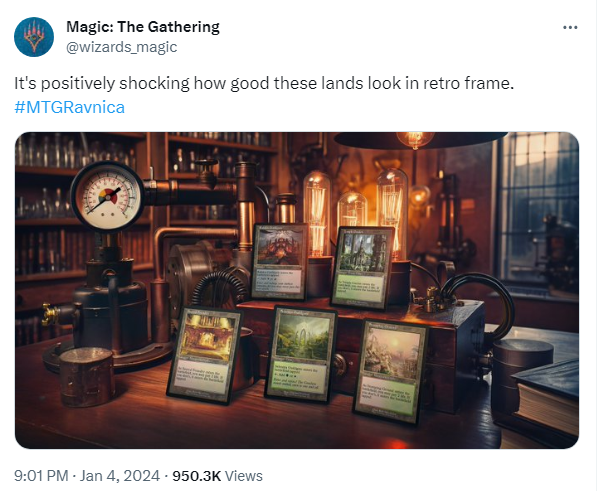
Magic: The Gathering (MtG) maker Wizards of the Coast (WotC) has apologized after admitting it made a “mistake” in publishing a promotional image that included artwork at least partially generated using artificial intelligence tools. The admission comes despite a WotC policy barring the use of AI in its art, and the controversy has already caused at least one MtG artist to publicly announce that he is “done” with the company.
The promo image in question was posted in a now-deleted (but still archived) social media post last Thursday, showing five new “retro frame” versions of lands from the upcoming Ravnica Remastered set in a nondescript steampunk-style laboratory. While the image looks unobjectionable at first glance, careful viewers soon zoomed in on specific and incongruous background details in the lab that showed telltale errors common to some AI image generators. (The human authorship of the art on the cards themselves, it should be noted, has not yet come under question.)
“created by humans” Right… pic.twitter.com/gf9TUXWSPA
— TaylorGreen (@GreenSkyDragon) January 5, 2024
The suggestion that AI art tools were used in a promo image is particularly sensitive for Wizards of the Coast, which has relied on hundreds of human artists to generate tens of thousands of iconic images for its Magic cards and its Dungeons & Dragons (D&D) products over the years. Last August, when a longtime D&D artist was found to be using AI tools for commissioned pieces, WotC said that it was “updating our artist guidelines to make clear that artists must refrain from using AI art generation as part of their art creation process for developing D&D art.”
In December, amid a wave of company layoffs that included many human art directors, WotC publicly reaffirmed its “internal guidance” that “we require artists, writers, and creatives contributing to the Magic TCG to refrain from using AI generative tools to create final Magic products.”
As accusations of AI use in the creation of the promo image grew throughout the day, WotC posted multiple defenses on Thursday (such as this archived, now-deleted post) insisting that the art in question “was created by humans and not AI.” But given the evidence, the situation was too much for veteran MtG artist Dave Rapoza, who has created art for dozens of Magic cards going back years.
“And just like that, poof, I’m done working for Wizards of the Coast,” Rapoza wrote on social media on Saturday. “You can’t say you stand against this then blatantly use AI to promote your products… If you’re gonna stand for something you better make sure you’re actually paying attention, don’t be lazy, don’t lie.”
Whoopsy-daisy
Well, we made a mistake earlier when we said that a marketing image we posted was not created using AI. Read on for more. (1/5)
— Magic: The Gathering (@wizards_magic) January 7, 2024
By Sunday afternoon, WotC had backtracked on its initial claims, saying on social media that it “made a mistake earlier when we said that a marketing image we posted was not created using AI.” In the same thread, WotC explained that the art, which it says was provided by an outside vendor, included “some AI components that are now popping up in industry standard tools like Photoshop… even if a human did the work to create the overall image.”
In an accompanying statement on its website, WotC thanked the “diligent community” that noticed the issue and said it was “rethinking our process of how we work with vendors for our marketing creative… We can’t promise to be perfect in such a fast-evolving space, especially with generative AI becoming standard in tools such as Photoshop, but our aim is to always come down on the side of human-made art and artists.”
Rapoza said in a follow-up message Sunday evening that he was “not going to return for work” with the company even after hearing WotC’s explanation. “Let’s see how this all pans out over time,” he wrote. “My hope is they stick to their word but everyone seems to be heading that direction so I’ll hang for awhile.”
But for others, WotC’s handling of the controversy highlights just how difficult it can be to maintain an outright ban on AI-generated art, even for companies that, like WotC, say they want to work with human artists.
“My stance is that the larger the entity and the more AI develops, it’s going to get harder and harder to spot,” freelance MtG artist Jason Rainville wrote on social media. “It’s going to squeak through, especially [with] the amount of freelancers and vendors out of house.”
https://arstechnica.com/?p=1994427

